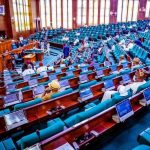Investigating the purported disappearance of 13,350 diapers intended for prenatal care at a Primary Health Center in the Sambawa town of Kebbi is a top priority for the Independent Corrupt Practices and Other Related Offenses Commission.
The commission declared that it will look into the illegal activity and hold those responsible accountable.
At a one-day conference that the ICPC hosted in Abuja on Thursday, Dr. Musa Adamu, the chairman of the organization, made this statement.
“Engendering Corruption-Free Primary Health Care Delivery For All” is the conference’s subject, according to the News Agency of Nigeria (NAN).
“Recently, the Sambawa community in Kebbi State sent a petition to us regarding missing antenatal care items for pregnant women and newborn babies donated to a healthcare facility.
“Our preliminary investigation indicated that the missing diapers allocated to Sambawa Primary Healthcare Centre are 13,350 pieces, while the investigation by Kebbi State Primary Healthcare Agency puts it at 3,466,” Adamu said.
He said that a man and a female employee of the Sambawa Primary Healthcare Center had been charged with crimes related to the missing articles. The commission aims to investigate the criminal activity and prosecute those responsible.
He also mentioned the growing interest that civil society organizations and communities have in combating corruption in the health sector.
The commission’s head announced that steps were being taken to guarantee that primary healthcare in the nation is provided without corruption.
Adamu pointed out that the conference was organized by the commission as a part of the initiatives to mobilize and cultivate public support for the country’s fight against corruption.
He claims that the conference is especially designed to spark conversations that would enhance the provision of services in the health sector and eliminate opportunities for fraudulent practices.
“This has become necessary considering the sector’s critical nature and its role in ensuring a healthy society at all levels.
“The Commission’s choice of Primary Health Care in the Federal Capital Territory (FCT) as the pilot for the nationwide conversation is to create a comprehensive template that can be replicated in all the six geopolitical zones of the federation.
“Participants were carefully drawn from community healthcare stakeholders to have a holistic and collaborative approach to improving the effectiveness of primary healthcare service delivery,” he said.
In order to address issues that prevent people from enjoying a corruption-free healthcare system in Nigeria, he pointed out that the Memoranda of Understanding (MoU) to be signed at the conference would provide opportunities for the cross-fertilization of anti-corruption ideas and harnessing available resources.
Muhammad Ali Pate, the country’s minister of health, also spoke, stating that corruption was one of the many issues facing PHCs and that it needed to be addressed immediately.
He went on to say that corruption in the healthcare industry could not be separated from other industries.
According to Pate, Nigeria had a bright future, but only if its people worked together and took the correct actions would prosperity materialize.
“So, when we look at the issue of corruption in Nigeria, which is a long-standing issue, it’s almost everywhere but how do you address it?
“It’s a huge challenge and it’s a systemic challenge. It is also a multi-institutional challenge, this conversation will determine what to do about it.
“The volume of mortality is on the poorest when we access Nigeria’s health utilisation and output in the continent, compared to so many other countries,” Pate said.
The Health Minister says that regulatory agencies must be strengthened to prevent them from turning into predators.
Primary healthcare, according to Dr. Chris Isiguzo, National President of the Nigeria Union of Journalists (NUJ), is the cornerstone of any country’s healthcare system.
“It is the first point of contact for individuals, families, and communities, playing a critical role in preventing diseases, promoting health, and ensuring the well-being of our citizens.
”However, the integrity and efficacy of this vital sector can be severely undermined by corruption.
“Corruption in primary health care delivery not only diverts essential resources but also erodes trust in public institutions, compromises the quality of care, and disproportionately affects the most vulnerable in our society,” Isiguzo noted.
He declared that the union would not back down in the war against corruption in the country.
Representatives from the World Health Organization (WHO), the Nigerian Medical Association (NMA), the National Commission for Persons with Disabilities (NCPWD), and the United Nations Development Office on Drugs and Crime (UNODC) were in attendance at the conference.




